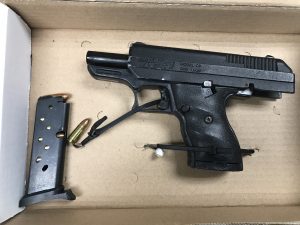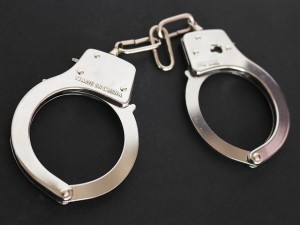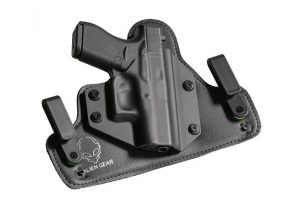 Three men were arrested after Prince George’s County Police executed a search warrant at an apartment in Laurel. Police seized more than 3,000 fentanyl pills, cash and numerous weapons. One of the weapons was an AK-47 style semi-automatic machine gun. The main defendant, was recently charged by the State’s Attorney’s Office in a 20-count Circuit Court indictment, which includes eight felony counts. The charges include possession with intent to distribute narcotics, possession with intent to distribute fentanyl, firearm possession in a drug trafficking crime, CDS possession and machine gun aggressive purpose. The machine gun law under 4-405 of the Maryland criminal code is basically an enhanced statute that has double the maximum penalty of a possession of a typical firearm. While this law does not provide a mandatory minimum penalty, it does carry a 10-year maximum prison sentence upon conviction. For comparison, illegal possession of a regulated firearm under the Maryland public safety code and wear, transport and carry of a firearm both carry a 5-year maximum penalty.
Three men were arrested after Prince George’s County Police executed a search warrant at an apartment in Laurel. Police seized more than 3,000 fentanyl pills, cash and numerous weapons. One of the weapons was an AK-47 style semi-automatic machine gun. The main defendant, was recently charged by the State’s Attorney’s Office in a 20-count Circuit Court indictment, which includes eight felony counts. The charges include possession with intent to distribute narcotics, possession with intent to distribute fentanyl, firearm possession in a drug trafficking crime, CDS possession and machine gun aggressive purpose. The machine gun law under 4-405 of the Maryland criminal code is basically an enhanced statute that has double the maximum penalty of a possession of a typical firearm. While this law does not provide a mandatory minimum penalty, it does carry a 10-year maximum prison sentence upon conviction. For comparison, illegal possession of a regulated firearm under the Maryland public safety code and wear, transport and carry of a firearm both carry a 5-year maximum penalty.
Two of the defendants face numerous mandatory minimum sentences for firearm possession in a drug trafficking crime under Maryland criminal law 5-621. The focus of any criminal defense strategy typically begins with the crimes that carry mandatory jail time, as even the most lenient judges are unable to get around a mandatory sentence. After addressing the firearm drug trafficking charges, the focus will likely shift to the fentanyl possession with intent to distribute count. Under Maryland law, PWID fentanyl carries a maximum penalty of 10 years in prison, which is half the 20-year maximum penalty for PWID narcotics such as cocaine or heroin. On the other hand, the sentencing guideline offense score is significantly higher for a fentanyl charge than a standard narcotics charge. While this makes little logical sense, the fentanyl statute is newer, and rather than lower the maximum penalty for narcotics distribution (which always scare lawmakers) the legislature simply made a more reasonable and modern maximum penalty for the fentanyl charge.
The main defendant in this case will have to face trial in the Circuit Court for Prince George’s County, but he has another case to take care of first. Court records show that he pled guilty to a misdemeanor gun possession offense and a misdemeanor conspiracy to possess narcotics with intent to distribute back in 2022. He was originally in drug court, though it appears he was removed from drug court last week and will be sentenced on the original charges in March. The second co-defendant does not appear to have a prior criminal record in Maryland, though he hails from Washington D.C. Finally, the third co-defendant, a young man from Howard County, faces charges for drug possession, false statement to a law enforcement officer and machine gun aggressive purpose for this incident. He is currently being held without bail in Howard County for charges stemming from an alleged unrelated second degree assault and is scheduled to appear in the District Court for Prince George’s County in February.
 The United States Attorney’s Office recently announced a 44-year-old man from Silver Spring was sentenced to nearly 5 years in prison for possession of a firearm by a convicted felon. He was also charged with possession of ammunition by a convicted felon due to the firearm being loaded when it was seized by police. According to facts that were recited during the plea agreement, an off-duty police officer with the Riverdale Park Police Department was working as a restaurant security guard when he was informed about a suspicious individual possibly possessing a firearm. A restaurant employee apparently told the off-duty cop that a patron entered the establishment with a fanny pack that potentially contained a gun. The tip was corroborated when two other individuals reported that they had been threatened with a firearm while at the restaurant. Officers responded to the scene and found the suspect by the door to the restaurant’s kitchen. Upon seeing the officers, the suspect fled and discarded the fanny pack as he was running. Police apprehended the suspect and located the fanny pack, which contained a Glock .45 caliber handgun loaded with 8 rounds of ammunition. Police later determined that the suspect was prohibited from possessing a firearm due to a prior felony conviction.
The United States Attorney’s Office recently announced a 44-year-old man from Silver Spring was sentenced to nearly 5 years in prison for possession of a firearm by a convicted felon. He was also charged with possession of ammunition by a convicted felon due to the firearm being loaded when it was seized by police. According to facts that were recited during the plea agreement, an off-duty police officer with the Riverdale Park Police Department was working as a restaurant security guard when he was informed about a suspicious individual possibly possessing a firearm. A restaurant employee apparently told the off-duty cop that a patron entered the establishment with a fanny pack that potentially contained a gun. The tip was corroborated when two other individuals reported that they had been threatened with a firearm while at the restaurant. Officers responded to the scene and found the suspect by the door to the restaurant’s kitchen. Upon seeing the officers, the suspect fled and discarded the fanny pack as he was running. Police apprehended the suspect and located the fanny pack, which contained a Glock .45 caliber handgun loaded with 8 rounds of ammunition. Police later determined that the suspect was prohibited from possessing a firearm due to a prior felony conviction.
 The United States Attorney’s Office recently announced a 44-year-old man from Silver Spring was sentenced to nearly 5 years in prison for possession of a firearm by a convicted felon. He was also charged with possession of ammunition by a convicted felon due to the firearm being loaded when it was seized by police. According to facts that were recited during the plea agreement, an off-duty police officer with the Riverdale Park Police Department was working as a restaurant security guard when he was informed about a suspicious individual possibly possessing a firearm. A restaurant employee apparently told the off-duty cop that a patron entered the establishment with a fanny pack that potentially contained a gun. The tip was corroborated when two other individuals reported that they had been threatened with a firearm while at the restaurant. Officers responded to the scene and found the suspect by the door to the restaurant’s kitchen. Upon seeing the officers, the suspect fled and discarded the fanny pack as he was running. Police apprehended the suspect and located the fanny pack, which contained a Glock .45 caliber handgun loaded with 8 rounds of ammunition. Police later determined that the suspect was prohibited from possessing a firearm due to a prior felony conviction.
The United States Attorney’s Office recently announced a 44-year-old man from Silver Spring was sentenced to nearly 5 years in prison for possession of a firearm by a convicted felon. He was also charged with possession of ammunition by a convicted felon due to the firearm being loaded when it was seized by police. According to facts that were recited during the plea agreement, an off-duty police officer with the Riverdale Park Police Department was working as a restaurant security guard when he was informed about a suspicious individual possibly possessing a firearm. A restaurant employee apparently told the off-duty cop that a patron entered the establishment with a fanny pack that potentially contained a gun. The tip was corroborated when two other individuals reported that they had been threatened with a firearm while at the restaurant. Officers responded to the scene and found the suspect by the door to the restaurant’s kitchen. Upon seeing the officers, the suspect fled and discarded the fanny pack as he was running. Police apprehended the suspect and located the fanny pack, which contained a Glock .45 caliber handgun loaded with 8 rounds of ammunition. Police later determined that the suspect was prohibited from possessing a firearm due to a prior felony conviction.
 Criminal Defense Lawyer Blog
Criminal Defense Lawyer Blog






